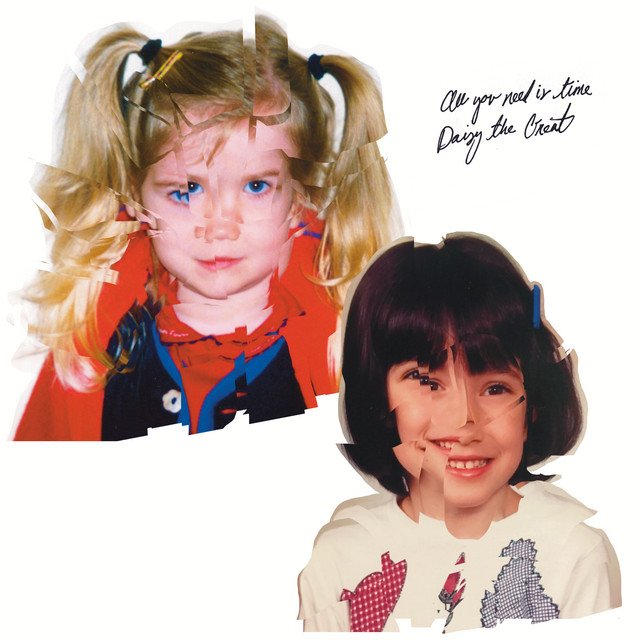All You Need is Time by Daisy the Great
I found All You Need is Time on January 11, despite its release date being nearly three months prior. I usually trend more toward realism, but I think this was fate. I have never connected so much with a record before; I must have needed it at that moment.
This is the second album by Daisy the Great, a Brooklyn-based band with frontrunners Kelley Nicole Dugan and Mina Walker, recorded at Studio G, produced by Torna (Ronnie DiSimone), and released with S-Curve Records. Famous (and viral) for “The Record Player Song” from their 2018 EP I’ve Got a Few Friends and I Wish They Were Mine, Daisy the Great was already familiar to me. While that EP and their debut album I’m Not Getting Any Taller (2019) are more in the realm of indie pop, this new album adopts a punk-ish and rock influence, featuring Bernado Ochoa and Matt Lau on bass and electric guitar, notably soloing on songs such as “Time Machine” and “I Don’t Wanna Fall.” As their genre shifted and their sound matured, their lyricism did as well, growing from teenage, dreamlike angst to full-grown rage, euphoria, and existentialism. With their sophomore record, Dugan and Walker once again use harmony as an instrument, blending their voices together almost to the point of no return; at times it is as if they are one, multi-dimensional singer. Harmony feels like an ethos to their creative process; overlapping and complementary melodies are their tool to unveil something beyond the notes. With this explosive second record, Daisy the Great finds a way to use heartbreak, identity, insecurity, and femininity to conceptualize their existence and to poignantly question reality.
The opening and closing tracks on this album, “Time Machine” and “Smile Pretty Girl,” are both dissertations, diary entries, and everything in between. “Time Machine” is a sonically dynamic masterpiece, opening with just vocals and guitar (“Are you listening to the clocks in this house?”), transitioning to a simple piano chord progression to accompany the verses, then building with the anxiety of the lyrics. The bridge is an existentialist refrain: “If I go back? If I go back? Will I do it all the same again?” which builds to a final chorus. This song feels like it's written for young people; the generation faced with the terrifying reality of our political and environmental climate at the same time as our first loves and heartbreaks. On the tail end of the album, “Smile Pretty Girl” is musically the polar opposite of “Time Machine,” with acoustic finger-picked guitar as the main instrument complimenting high-register harmonies. However, it similarly tackles enormous questions and feelings. The character of time reappears, as this song holds the album title in its chorus: “Some people say that all you need is time/ but what if I'm still waiting when I die?” Dugan and Walker speak to us as they speak to themselves, encapsulating fears of death, questions of identity, and struggles with womanhood into seemingly simple questions.
Within the sandwich of those two treasure troves, the rest of the album is similarly introspective and imaginative. The self takes many forms in Dugan and Walker’s songwriting as they are constantly trying to understand themselves, especially in relation to other people. Where “Record Player Song” (2018) lamented “wish I’d been a teenage rebel,” “I’m Just Another Person Oh God” off All You Need is Time asks: “Am I just a greedy woman/or just another person?” The change in regarding oneself as a woman or person compared to a teenager scraping their knees is a testament to the growth that has occurred between projects. “Aluminum” and “Liar” hold fragile confessions with lines like “all I want is somebody to say I'm somebody,” and “I’m an animal/ I wish I was made of what you are.” The vulnerability of this album is an integral part of its strength, and that duality is a central thesis of the band. In an interview with Mundane Magazine, they explained the significance of their band name, particularly of the epithet, “the Great.” To quote: “We both thought it was perfect because it perfectly represents something delicate while emphasizing the power in it.” That central thesis is once again present in their use of harmony, in the idea that there is more power in connection, in allowing your voice to blend with someone else’s. Sharing such vulnerable questions with another voice is an intrinsically vulnerable process, but it results in a deeply emotional and authentic album and sound.
Recently I have found myself looking for art that feels purposeful, both in my own practice and in the art I encounter in the world; this album does that for me. It doesn't pretend that people exist in isolation and instead frames its explorations of identity within the context of human connection, the good and bad. Heartbreak is a tool, not a weakness nor a cliché, and it is used in these songs to try and make sense of the world. The record feels like something that needed to be said; every lyric is a feeling that I have felt but not had the words for. It’s an inspiring project, one that makes me want to make more music––what more can you ask for?

